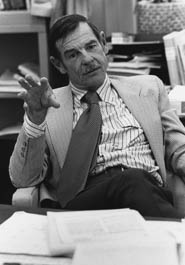A Brief History (prepared for Departmental Self Study, 1995; updated 2008)
According to research conducted by the late Professor A. Lee Coleman, the word "sociology" first appeared in the University of Kentucky's catalogue for 1908-09, with the following course listing:
- Two hours per week. Charities and Corrections, two terms. A course dealing with the problem of poverty, crime, insanity, and social degeneration. Text, American Charities, Warner. Continued the third term as Social Psychology. A study of the social mind and its reaction on the individual mind, as manifested in custom, fashion, public opinion, and other forms. Text, Social Psychology, Ross.
 Sociology was among the offerings of the Department of History, Political Economy, and Metaphysics, located in the College of Arts & Sciences. In 1914-15, two courses in Rural Sociology were introduced in the Department of Farm Economics in the College of Agriculture. Since that time, Sociology has been represented in both Arts & Sciences and Agriculture. Until the 1960s, the Colleges had separate departments, but a merger into a single Department of Sociology (with administrative reporting relationships to both Agriculture and Arts & Sciences) occurred during that decade so that communication and professional collaboration among the University's sociologists could be enhanced. This arrangement continued until 2002, when the College of Agriculture combined rural sociology and several related disciplines into a new Department of Community and Leadership Development. The Department of Sociology continued to exist as a department of the College of Arts and Sciences.
Sociology was among the offerings of the Department of History, Political Economy, and Metaphysics, located in the College of Arts & Sciences. In 1914-15, two courses in Rural Sociology were introduced in the Department of Farm Economics in the College of Agriculture. Since that time, Sociology has been represented in both Arts & Sciences and Agriculture. Until the 1960s, the Colleges had separate departments, but a merger into a single Department of Sociology (with administrative reporting relationships to both Agriculture and Arts & Sciences) occurred during that decade so that communication and professional collaboration among the University's sociologists could be enhanced. This arrangement continued until 2002, when the College of Agriculture combined rural sociology and several related disciplines into a new Department of Community and Leadership Development. The Department of Sociology continued to exist as a department of the College of Arts and Sciences.
Despite this organizational change, all sociologists in Community and Leadership Development have continued to have joint appointments in Sociology, and several have continued to teach on a regular basis in the Department of Sociology. In addition, sociologists from Community and Leadership Development as well as the College of Education, the College of Health Sciences, the College of Medicine, the College of Public Health, and the College of Social Work are members of the Graduate Faculty in Sociology, giving the department’s graduate students access to a wide range of intellectual resources.
Throughout the department’s history, sociology faculty have updated the curriculum and provided students with courses and research and service opportunities that reflect the newest developments in the discipline. Currently, the faculty is emphasizing courses and research mentoring in the following areas:
- CRIME, LAW & DEVIANCE;
- FAMILIES, CHILDREN, AND HEALTH;
- POLITICAL SOCIOLOGY & SOCIAL MOVEMENTS;
- RURAL SOCIOLOGY & DEVELOPMENT;
- SOCIAL INEQUALITIES;
- WORK, ORGANIZATIONS & ECONOMY.
These areas incorporate faculty interests and expertise in other substantive specialties such as applied sociology, community, cross-national comparative sociology, environmental sociology, gender, media studies, science and technology, social psychology, and sociology of religion.
*Photo of Dr. Thomas Robert Ford, 1978 - courtesy of the University Archives
